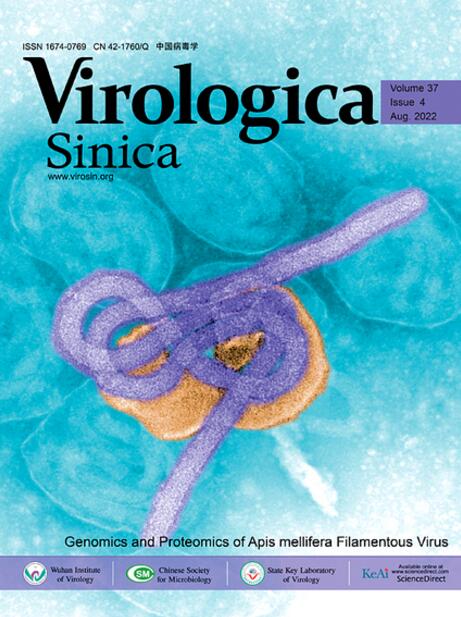Antibacterial activity evaluation of a novel K3-specific phage against Acinetobacter baumannii and evidence for receptor-binding domain transfer across morphologies
IF 5.5
3区 医学
Q1 Medicine
引用次数: 0
Abstract
Acinetobacter baumannii (A. baumannii) poses a serious public health challenge due to its notorious antimicrobial resistance, particularly carbapenem-resistant A. baumannii (CRAB). In this study, we isolated a virulent phage, named P1068, from medical wastewater capable of lysing CRAB, primarily targeting the K3 capsule type. Basic characterization showed that P1068 infected the A. baumannii ZWAb014 with an optimal MOI of 1, experienced a latent period of 10 min and maintained stability over a temperature range of 4–37 °C and pH range of 3–10. Phylogenetic and average nucleotide identity analyses indicate that P1068 can be classified as a novel species within the genus Obolenskvirus of the Caudoviricetes class as per the most recent virus classification released by the International Committee on Taxonomy of Viruses (ICTV). Additionally, according to classical morphological classification, P1068 is identified as a T4-like phage (Myoviridae). Interestingly, we found that the tail fiber protein (TFP) of P1068 shares 74% coverage and 88.99% identity with the TFP of a T7-like phage (Podoviridae), AbKT21phiIII (NC_048142.1). This finding suggests that the TFP gene of phages may undergo horizontal transfer across different genera and morphologies. In vitro antimicrobial assays showed that P1068 exhibited antimicrobial activity against A. baumannii in both biofilm and planktonic states. In mouse models of intraperitoneal infection, P1068 phage protected mice from A. baumannii infection and significantly reduced bacterial loads in various tissues such as the brain, blood, lung, spleen, and liver compared to controls. In conclusion, this study demonstrates that phage P1068 might be a potential candidate for the treatment of carbapenem-resistant and biofilm-forming A. baumannii infections, and expands the understanding of horizontal transfer of phage TFP genes.
新型 K3 特异性噬菌体对鲍曼不动杆菌的抗菌活性评估以及受体结合域跨形态转移的证据。
鲍曼不动杆菌(A. baumannii)因其众所周知的抗菌药耐药性,尤其是耐碳青霉烯类鲍曼不动杆菌(CRAB),对公共卫生构成了严重挑战。在这项研究中,我们从医疗废水中分离出了一种名为 P1068 的毒性噬菌体,它能够裂解 CRAB,主要针对 K3 胶囊型。基本特性分析表明,P1068 感染鲍曼不动杆菌 ZWAb014 的最佳 MOI 为 1,潜伏期为 10 分钟,并在 4 °C 至 37 °C 的温度范围和 3-10 的 pH 值范围内保持稳定。系统发育和平均核苷酸同一性分析表明,根据国际病毒分类委员会(ICTV)发布的最新病毒分类,P1068 可被归类为 Caudoviricetes 类 Obolenskvirus 属中的一个新物种。此外,根据经典形态学分类,P1068 被确定为 T4 类噬菌体(肌病毒科)。有趣的是,我们发现 P1068 的尾纤蛋白(TFP)与 T7 样噬菌体(Podoviridae)AbKT21phiIII(NC_048142.1)的 TFP 有 74% 的覆盖率和 88.99% 的同一性。这一发现表明,噬菌体的 TFP 基因可能会在不同属和形态之间发生水平转移。体外抗菌试验表明,P1068 对生物膜和浮游生物状态下的鲍曼不动杆菌都具有抗菌活性。在小鼠腹腔感染模型中,与对照组相比,P1068噬菌体能保护小鼠免受鲍曼尼氏菌感染,并显著减少脑、血液、肺、脾脏和肝脏等不同组织中的细菌量。总之,这项研究表明,P1068噬菌体可能是治疗耐碳青霉烯类和形成生物膜的鲍曼尼氏菌感染的潜在候选药物,并拓展了人们对噬菌体TFP基因水平转移的认识。
本文章由计算机程序翻译,如有差异,请以英文原文为准。
求助全文
约1分钟内获得全文
求助全文
来源期刊

Virologica Sinica
Biochemistry, Genetics and Molecular Biology-Molecular Medicine
CiteScore
7.70
自引率
1.80%
发文量
3149
期刊介绍:
Virologica Sinica is an international journal which aims at presenting the cutting-edge research on viruses all over the world. The journal publishes peer-reviewed original research articles, reviews, and letters to the editor, to encompass the latest developments in all branches of virology, including research on animal, plant and microbe viruses. The journal welcomes articles on virus discovery and characterization, viral epidemiology, viral pathogenesis, virus-host interaction, vaccine development, antiviral agents and therapies, and virus related bio-techniques. Virologica Sinica, the official journal of Chinese Society for Microbiology, will serve as a platform for the communication and exchange of academic information and ideas in an international context.
Electronic ISSN: 1995-820X; Print ISSN: 1674-0769
 求助内容:
求助内容: 应助结果提醒方式:
应助结果提醒方式:


